—Ronak Husni and Daniel L. Newman. A to Z of Arabic-English-Arabic Translation. Saqi, [2013].
— Alan Moore. The Great When. Bloomsbury, [2024].
simply messing about in books
—Ronak Husni and Daniel L. Newman. A to Z of Arabic-English-Arabic Translation. Saqi, [2013].
— Alan Moore. The Great When. Bloomsbury, [2024].

— Romance in the Library. The Romance Novel in English. Gallery Guide. [Cover title]. Illustrated. [64] pp. The Lilly Library, [2024].
Curated by Rebecca Baumann, this remarkable exhibition, Romance in the Library, likely the first of its kind, charts a revisionist history of English literature, with emphasis on women as readers of novels from the eighteenth century to the present, and claims an oft-scorned modern-day marketing genre construct — the romance novel — as a badge of honor. In the heyday of the gothic, which included the sentimental as well as the historical and supernatural, writing novels was an economic activity open to women even while the reading of them by women (especially young women) was viewed as unsuitable. Baumann’s retrospective claim is an assertion that works pretty well, but one has to abandon one’s preconceptions to find more than superficial kinship between The Wild Irish Girl or Pride and Prejudice and modern formula fiction. The shift from novels aimed at a genteel readership to a vast popular appetite for novels of romantic entertainment is rooted in greater educational opportunities for women at all economic levels and the nineteenth-century achievement of near universal literacy. A welcome and provocative exhibition.
Jane Austen’s Pride and Prejudice (1813) is in original boards, untrimmed. The stylish yellow and red dust jacket* for Boy Crazy by Grace Perkins (1931) is spectacular (and it’s inscribed to Upton Sinclair)! I wish I had taken a picture.
[lightly edited for clarity 16 Nov.]
* here’s an image of another copy of the book :
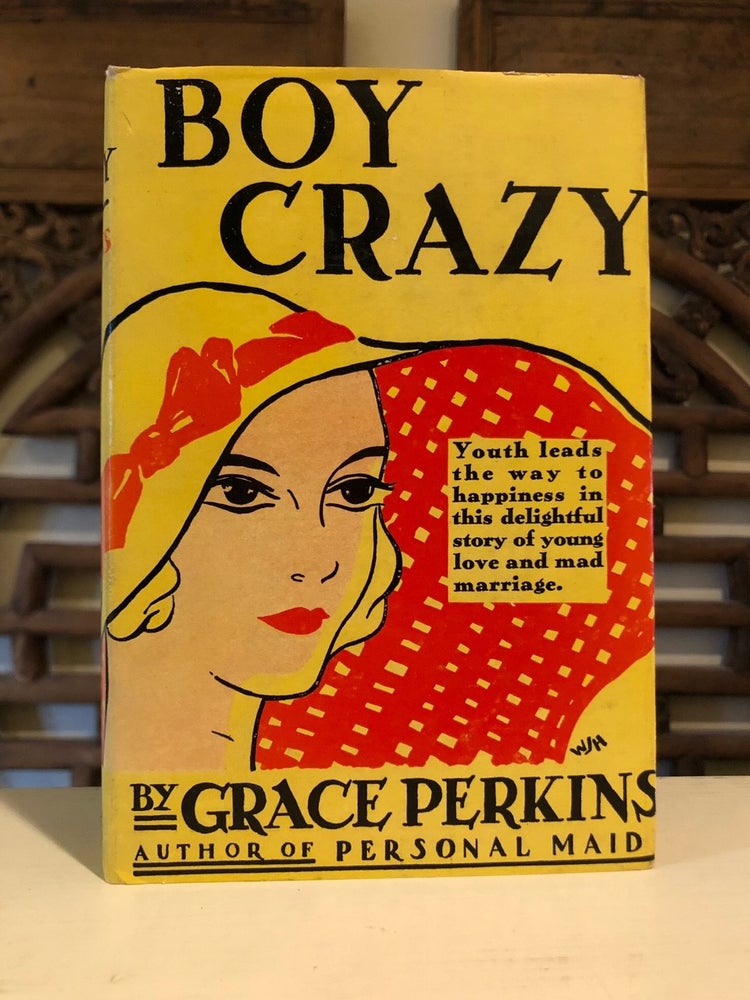
— — —
— Kasper van Ommen. Joseph Scaliger. His Oriental library, and the meaning of scholarship. [Cover title]. Illustrated. Brill, [n.d.].
——. Josephus Justus Scaliger. Sieerad van de Academie. Ornament of the Academy. [Cover title]. Text in Dutch and English. Illustrated. [Universiteit Leiden, 2020].
Two illustrated monographs on the great sixteenth-century polyglot and polymath Joseph Scaliger (1540-1609).
— — —
— The Dagon Collection. Auction Catalogue of Items Recovered in the Federal Raid on Innsmouth, Mass. Edited by Nate Pedersen. Cataloguing by Rebecca Baumann, with assistance from Jonathan Kearns. Illustrations by Liv Rainey-Smith and Eduardo Valdés-Hevia. Layout and Design by Andrew Leman. [PS Publishing, January 2024].
A catalogue of imaginary objects, rigorously described, with their history in vignettes by a wide variety post-Lovecraftian authors. Lot 13, The Geometry of Nowhere, is a dizzying book ; and lot 33, the Tiffany Lamp, is an unsettling piece.
— — —
— Michael Connelly. City of Bones. Dennis McMillan, 2002.
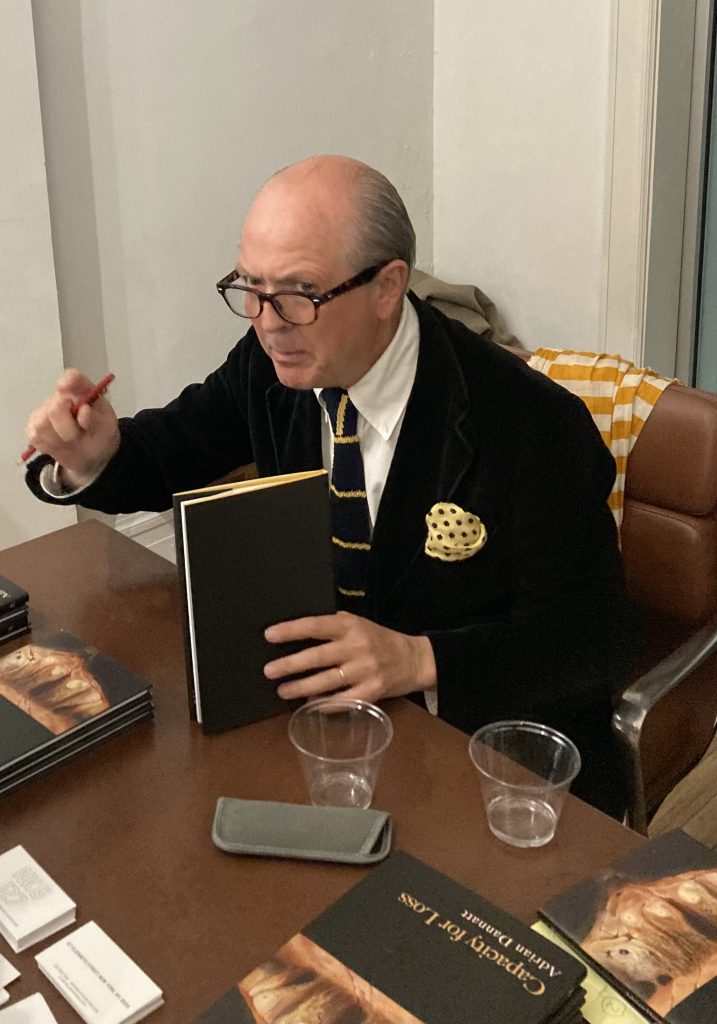
— Adrian Dannatt. Capacity for Loss. [Opium Books, 2024]. Edition of 300. Yellow cloth, dust jacket with illustration, Gaia, from the painting by Danny Moynihan.
Author Adrian Dannatt, debonair man about many towns, is seen in mid-gesture above, just a few minutes ago at the publishing party for the launch of his collection of poems, Capacity for Loss, at Nathalie Karg Gallery, amid an installation of Danny Moynihan’s paintings.
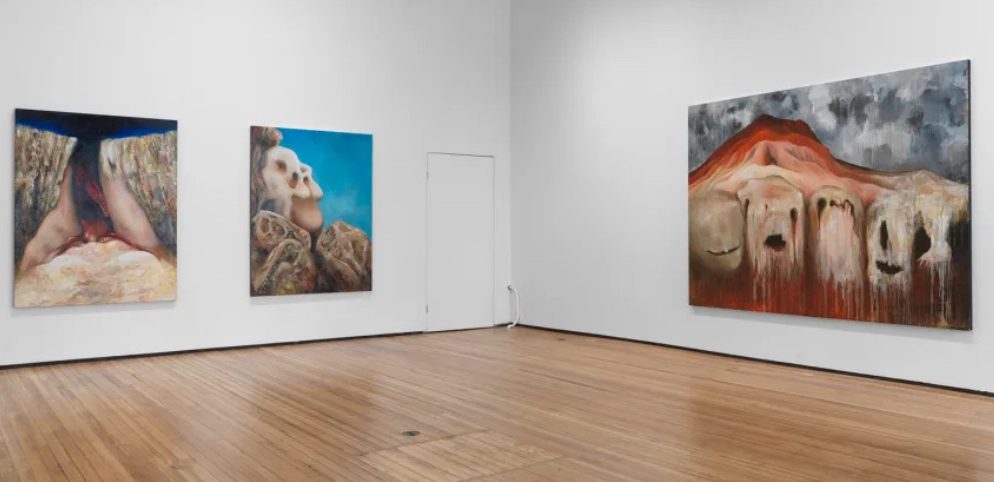
— — —
‘Sard Harker by John Masefield’ is an essay published for the centenary of this adventure novel set in Santa Barbara, most leeward of the sugar countries of South America, now up on Wormwoodiana. It is set in a South America of abandoned villages and mysterious temples, a land of adventure and visions, a paradise of metaphor and simile.
— — —
Your correspondent will be at the Boston International Antiquarian Book Fair, Friday through Sunday 8-10 November, at the Hynes Convention Center (Cummins booth 514). Come say hello. I will have copies of The Private Life of Books and others available.
— — —

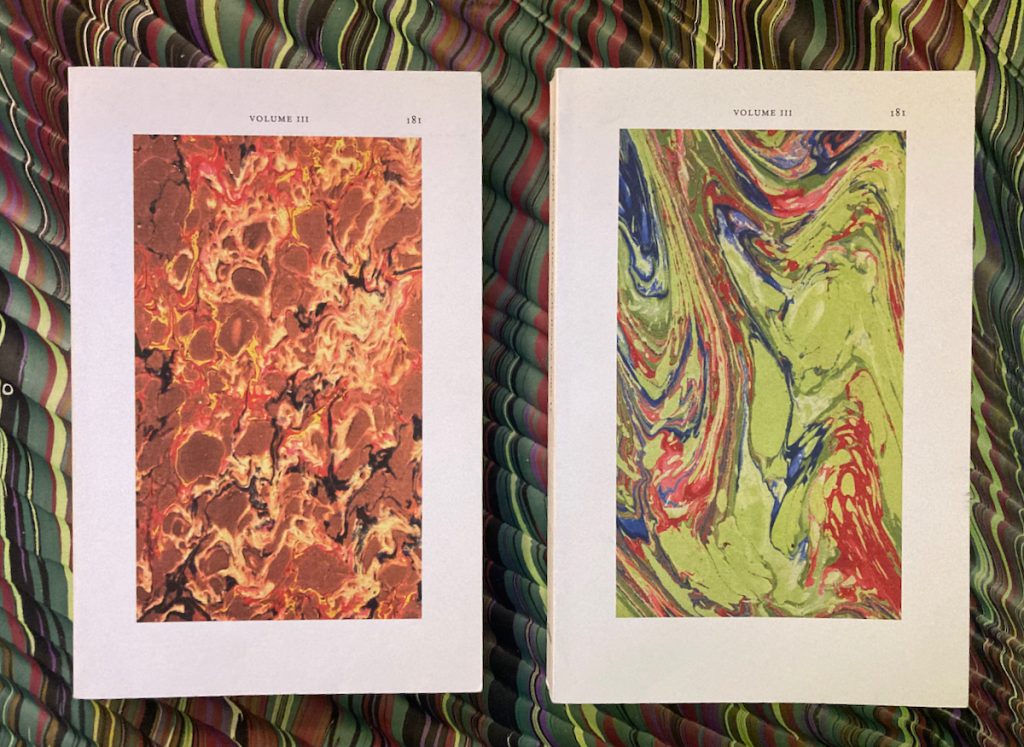
— Louis Lüthi. On the Self-Reflexive Page II. Illustrated throughout. 298,[4] pp. [Amsterdam: Roma Publications, 2021]. Pictured at right.
I pulled this from a shelf at IRIS, a nice bookstore in Montclair that just celebrated one year as an open shop. I remembered the title from a decade ago and was curious to see what the new iteration would hold. The emphasis is similar, reflections on pages in literature that perform in a different mood than prose text, from Laurence Stern’s Tristram Shandy (1759-67) to Walter Benjamin, André Breton, Harry Mathews, Donald Barthelme, and other recent writers. This new edition, with different images of marbled pages from Tristram Shandy for its covers, is much expanded, with more examples of pages : black, blank, drawing, document, photography, and text pages; and the essay is more discursive and takes in a wider scope of material than in the first edition (at left, above), which I had grabbed at a Printed Matter art book fair in the autumn of 2012 and noted here , with a visual nod to the allusions to Tristram Shandy that anchor the book. The 2010 edition is a book of 128 numbered pages, followed by a concise, unpaginated essay of 32 pages (including notes and bibliography).
The first edition included a loose leaf, a Prière d’inserer or “review slip” :
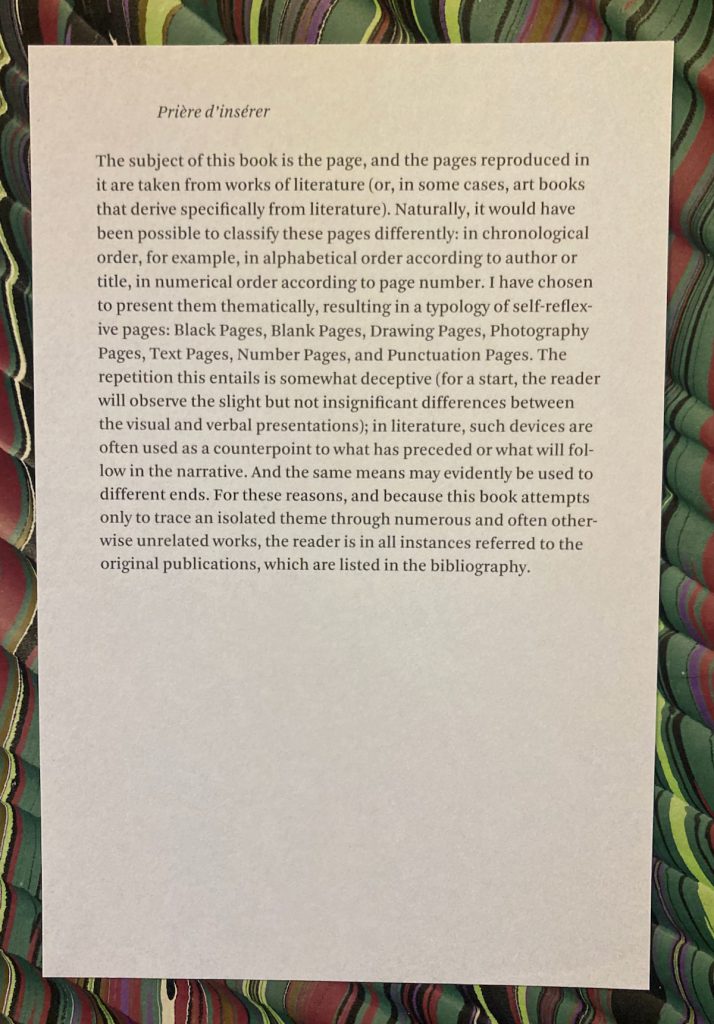
This reminded me of the playful review slip found in the S.P. copies of Raymond Queneau’s Exercices de Style (1947), which prints one of the exercices in the book :
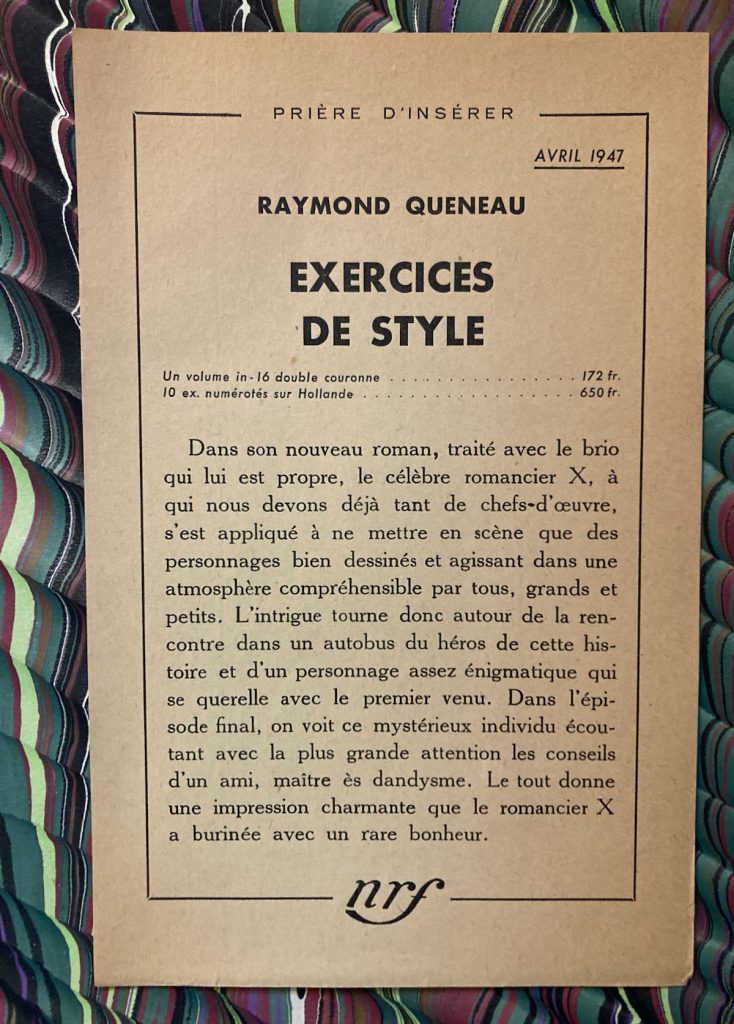
— — —
‘A leaf a gourd a shell a net a bag a sling a sack a bottle a pot a box a container’
snapshots from a recent Futurefarmers event, on a quiet street in the Mission district in San Francisco, wish I were there
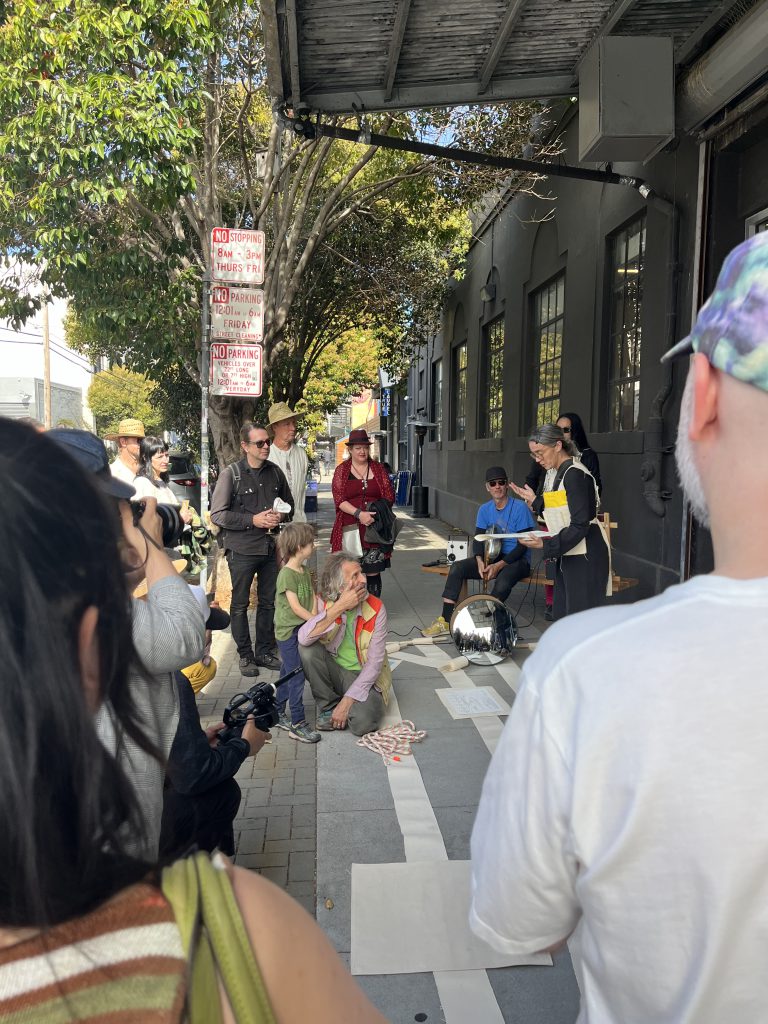
with artist Michael Swaine, well known to readers of the ’shelf as one of the instigators of the Weedwalk in San Francisco, an informal botanizing ramble, which included two memorable Book Walks, in 2007 and 2009.
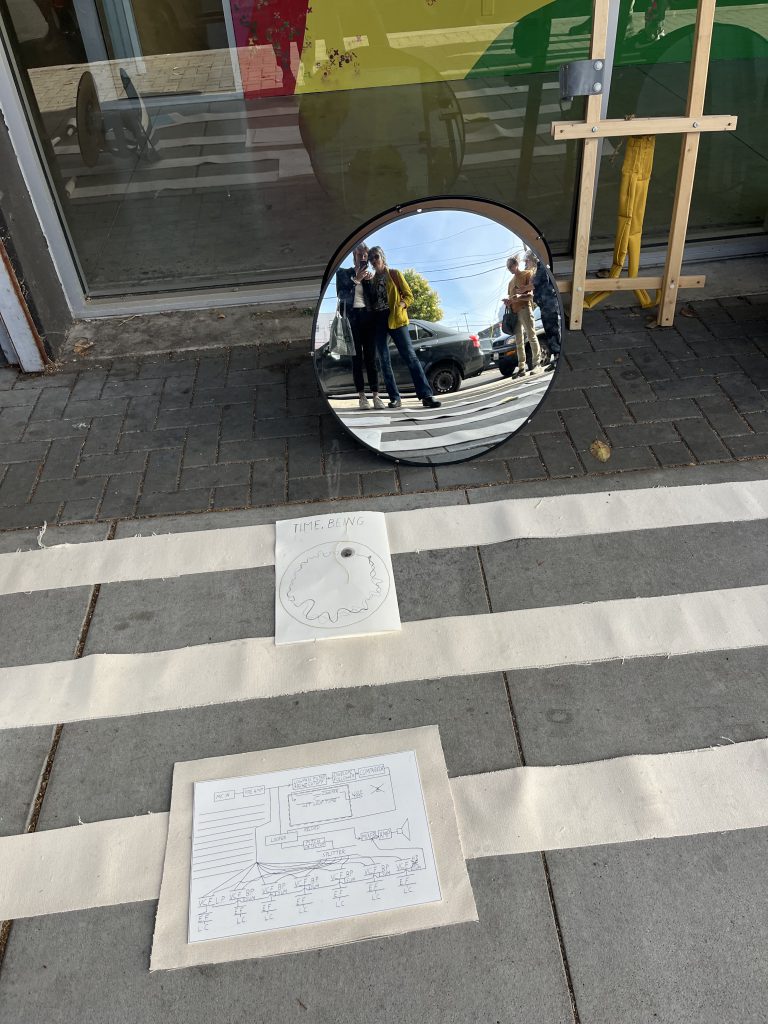

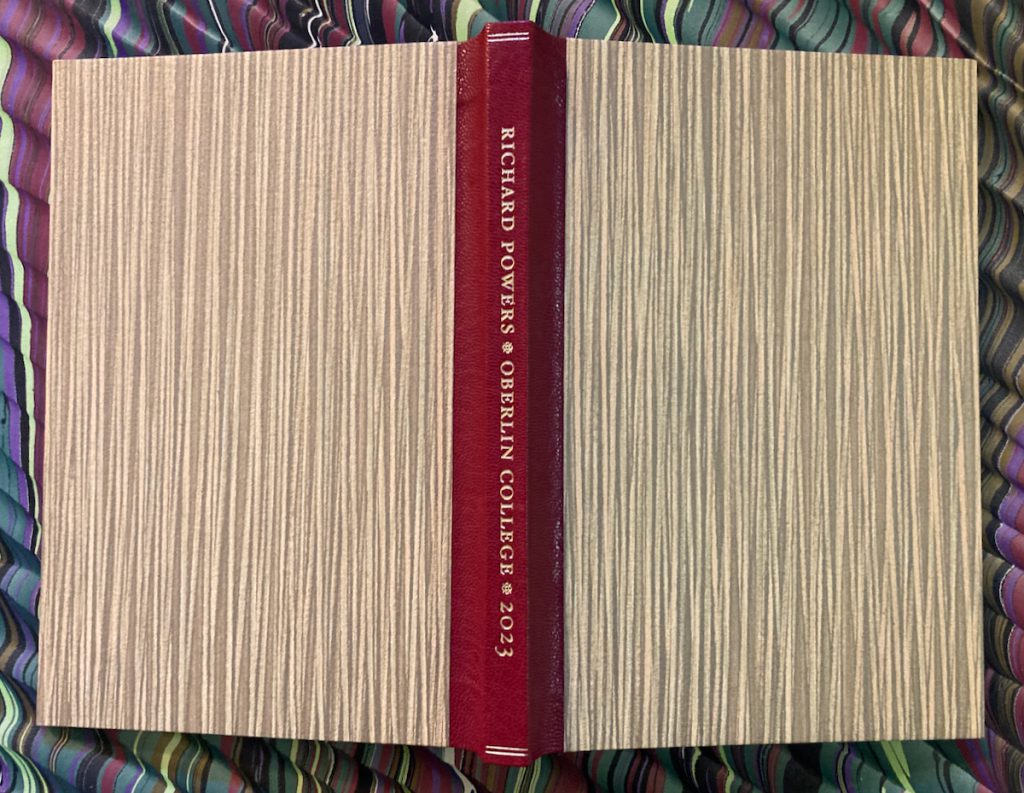
— Richard Powers. The Future Is behind You. Oberlin Commencement Address 2023. The Letterpress at Oberlin, 2023. One of 14 copies, specially bound (edition of 105, all signed by the author). [Gift of VH].
“It may feel like a catastrophe. And yet it may also be the most clarifying thing, if you can step back and read it as part of a story that is much more than yours.”
— — —
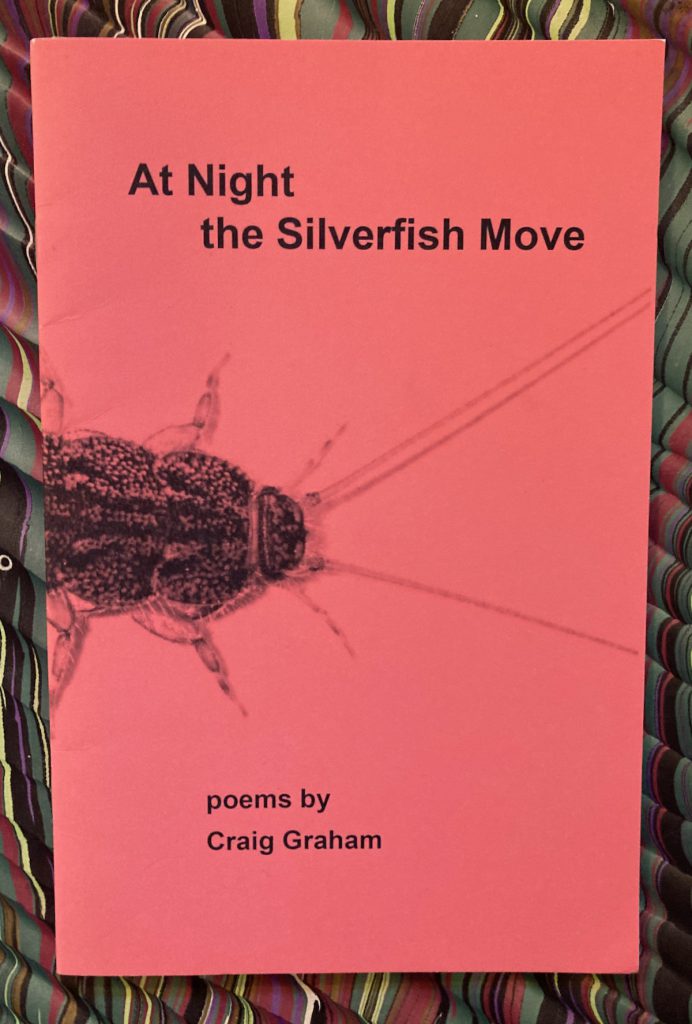
‘stealthy book killers’
— Craig Graham. At Night the Silverfish Move. Vagabond Books, 2023.
Snappy collection of three poems by bookseller Craig Graham: the title poem, “At Night the Silverfish Move (For Raymond Carver In Memoriam)”, dark, lethal, and funny; the predatory “Waiting for You”; and ending on the wistful optimism of “Juneteenth”. Graham is also author of Phantom Pain (2014). [Gift of the author].
— Henry James. The Turn of the Screw [1898]. Edited with an introduction and notes by David Bromwich. Penguin Books pbk.
The original serial publication, in Collier’s Weekly, had illustrations by John La Farge :
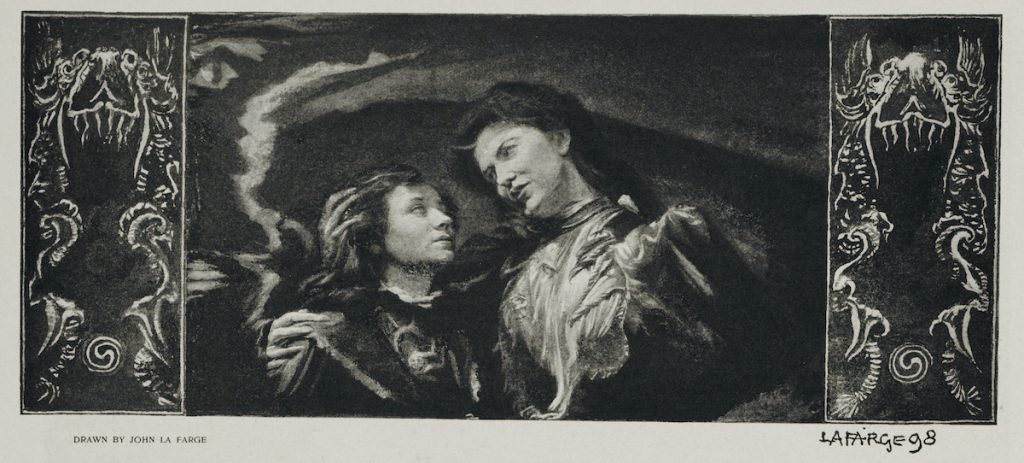
— — —
— Walter Klinefelter. The Fortsas Bibliohoax [1941]. Revised and Newly Annotated. Press of Ward Schori, 1986.
Anatomy of a celebrated and supremely successful hoax, a book auction catalogue from Belgium, 1840 : the collector, the books, the auction, entirely fictitious ; the original catalogue is now itself a rare book.
In conjunction with the Grolier Club exhibition “Melville’s Billy Budd at 100”, a symposium will be held on Wednesday evening 9 October, 6:30 to 8:00 p.m., at the Grolier Club, 47 east 60th street, in New York City. RSVP required (hybrid event with separate registration for virtual attendance, see link).
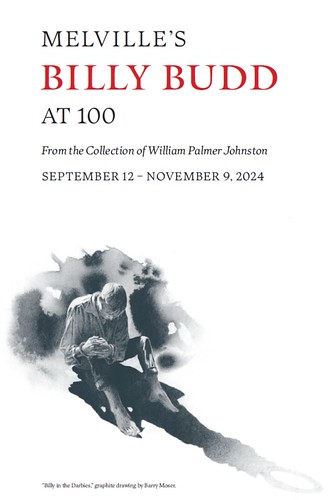
A panel of prominent Melvillians will address Melville’s masterpiece, each of them commenting on the centennial exhibition and its implications. This will be followed by a discussion on such topics as textual history, biographical context during Melville’s years of writing his “prose and poem concoction”, the text’s cultural journey in the 20th and 21st centuries, and its adaptations into theater, opera, film, and the visual arts, as well as areas for potential future exploration. The symposium will be moderated by Richard Brodhead, who taught English and American literature at Yale for 32 years before becoming president of Duke University. Brodhead’s writings on Melville include Hawthorne, Melville and the Novel, The School of Hawthorne, and New Essays on Moby Dick. He was elected to the American Academy of Arts and Sciences in 2004 and chaired the Academy’s 2013 commission on the humanities. The speakers will be John Bryant, David Greven, and Grolier members G. Thomas Tanselle and Henry Wessells.
Dr. Bryant, Professor Emeritus of English at Hofstra University, is a leading Melville scholar. Founding editor of Leviathan: A Journal of Melville Studies and director of the Melville Electronic Library, he received the Distinguished Editor Award from the Council of Editors of Learned Journals in 2015. He has contributed several books and numerous essays on Melville, American literature, and scholarly editing, including Melville and Repose (Oxford) and The Fluid Text (Michigan). He is currently working on the last volume of his three-volume biography, Herman Melville: A Half Known Life (Wiley). Dr. Greven is Professor of English at the University of South Carolina. His books include All the Devils Are Here: American Romanticism and Literary Influence (The University of Virginia Press, 2024), and a study of the films of Alfred Hitchcock, Intimate Violence (Oxford University Press, 2017). Tom Tanselle, a Past President of the Grolier Club, is a bibliographical scholar who for many years was the vice president of the John Simon Guggenheim Memorial Foundation and an adjunct professor of English at Columbia University. He was also one of the three primary editors of the fifteen-volume Northwestern-Newberry Edition of Melville, and he has published many other books. Henry Wessells is a writer and antiquarian bookseller in New York. He is the author of A Conversation larger than the Universe (2018), a catalogue accompanying his Grolier Club exhibition of the same name, The Private Life of Books (2020), and A Melville Census, John Marr & Timoleon (in press, forthcoming 2025).
Readers of the ’shelf and friends in the New York area are invited to an event and presentation, this year honoring PEDRO PONCE, the winner of the Second Tom La Farge Award for Innovative Writing, Teaching and Publishing
It will be held on Friday 11 October 2024, from 6:30 p.m. to 8:30 p.m., at the Ground Floor Gallery of the Grolier Club, 47 East 60th St..(between Madison and Park aves.), NYC, NY 10022.
Pedro will be interviewed, discuss the writing of Tom La Farge, and read from his own work.
This annual award in the amount of $10,000 is designed to encourage and foster literary activity that combines serious play, imagination, erudition and innovative practice. To learn more about the Tom La Farge Award :
https://www.thetomlafargeaward.com/
Refreshments will be served and the doors open at 6:30 pm.
The event is free and open to the public but seating is limited so please RSVP to : Wendy Walker, wwalker377@gmail.com
We look forward to sharing an evening of wonderful writing with you!
Wendy Walker
& the Tom La Farge Committee :
Corina Bardoff
Daniel Levin Becker
Sam Goodman
Michael Kowalski
Eliza Martin
Philip Ording
posted on behalf of the Committee by
Henry Wessells
Readers,
I try to post here on the ’shelf first, and sometimes then drop a link in the minuscule social media presence I maintain. I remember the early years of twitter with pleasure, but I scraped and escaped that platform a year ago ; I mothballed instagram at about the same time, abandoned in place and still accessible as there are videos relating to the Magazine of Poetry and readings at 725 Fifth avenue worthy of persistence (catalogue to come). I picked a mastodon iteration in late autumn of 2022 (what a strange couple of years it seems) : @endlessbookshelf@mastodon.iriseden.eu.
A small organic following evolved, but in recent months the iteration has been routinely unreliable and inaccessible to me : first I couldn’t upload images, and now I cannot even log on at all. Possibly it is user error, but equally possible, not. So I have established another account at : @endlessbookshelf@mastodon.social

fall feuilleton
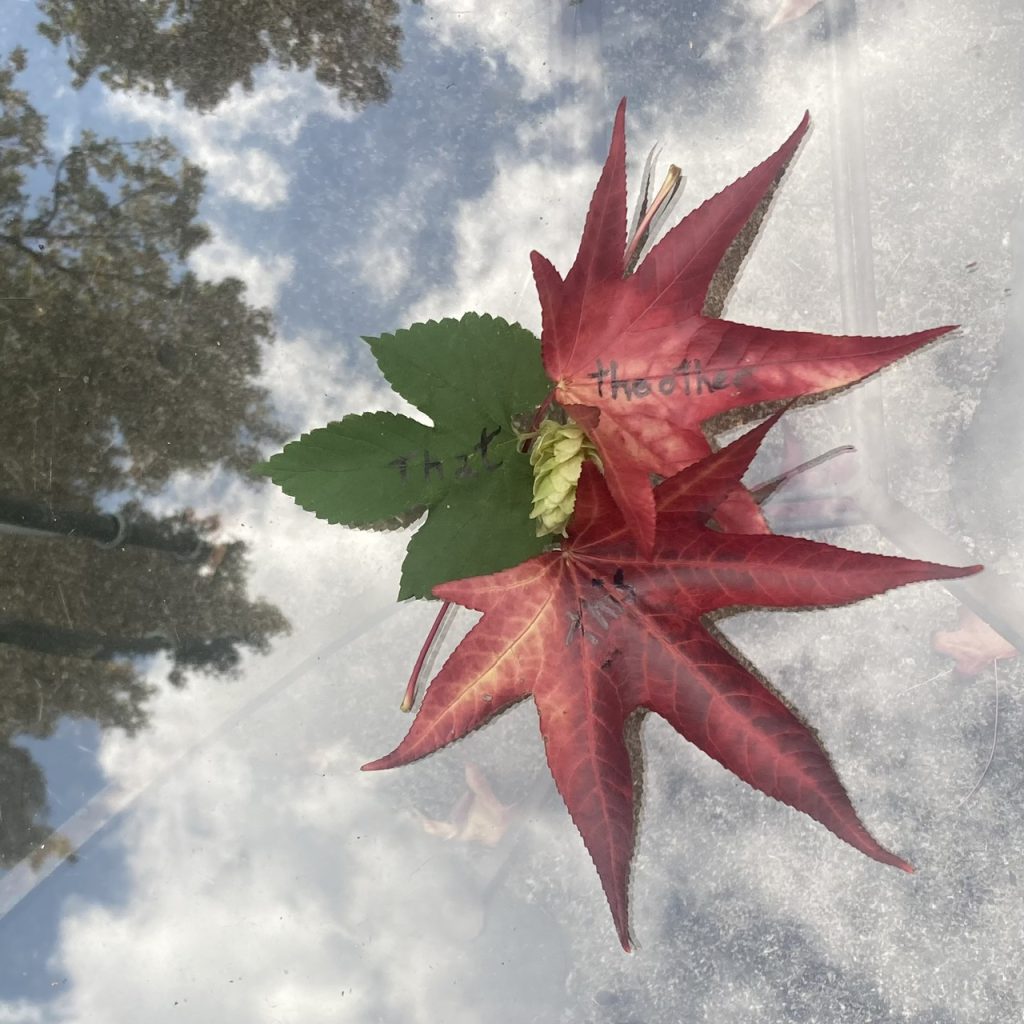
fall feuilleton, part two
— — —
“oscillating revisions”
— John Bryant, on certain passages in the fluid text of Melville’s Billy Budd
— — —
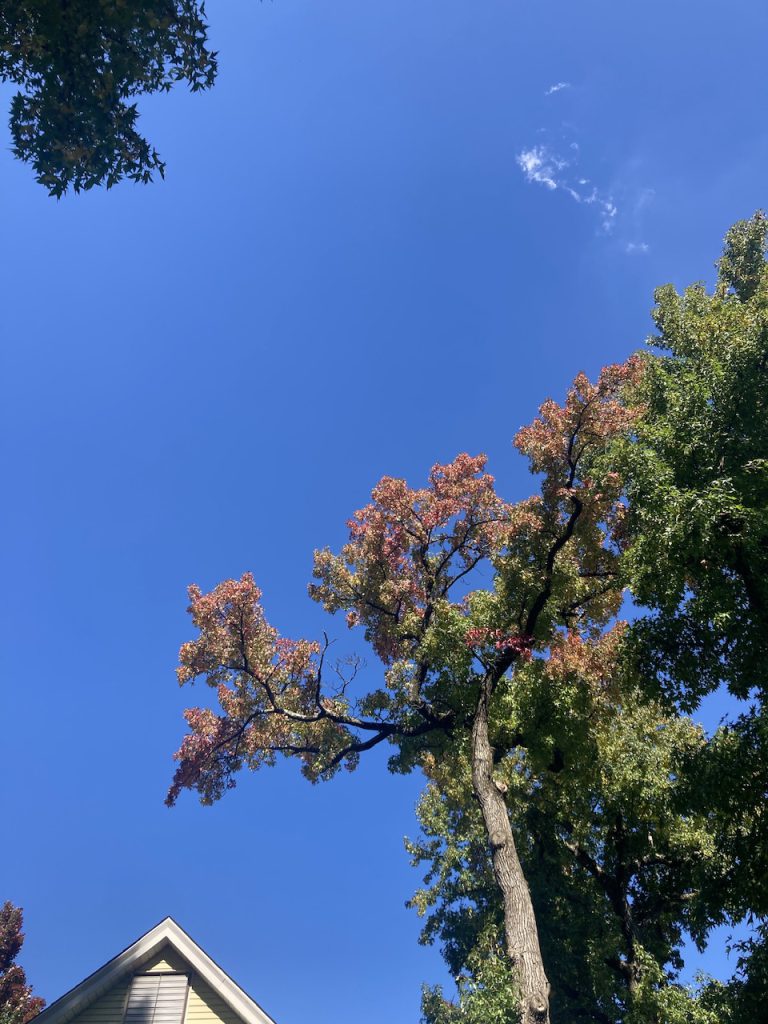 the view from the hammock
the view from the hammock
— — —
“You can’t always count on / things opening up for you / Know when to let go / learn how to fall.”
— “Skydiving”, Ishmael Reed, from Conjure, in a reading with Allen Ginsberg at the Library of Congress 29 April 1974
— — —
“Writing within conventions of language, and of genre, is like swimming in society rather than in a pond under a waterfall.”
— William S. Wilson
— — —
The illusion grew more perfect the closer to the trees he went. Now the needles seemed almost to be suggesting the grain of polished wood. It was the way they alternated colors and shades, darker green above lighter above darker, a random pattern solidifying into the whorls on a slab of monkeywood.
It was the door to his bedroom.
— Peter Straub. Ghost Story [1979]
— — —